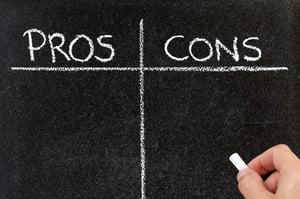 Making the decision to file a bankruptcy case is never easy; however, bankruptcy may be the best solution to your debt problems. Bankruptcy offers many advantages that other debt solutions do not offer. Although there are numerous advantages, there are also some disadvantages. To help you weigh your options, our attorneys discuss all of the pros and cons of Chapter 7 during your free bankruptcy consultation. Below are some of the common pros and cons of Chapter 7 that apply in most cases filed in Minnesota.
Making the decision to file a bankruptcy case is never easy; however, bankruptcy may be the best solution to your debt problems. Bankruptcy offers many advantages that other debt solutions do not offer. Although there are numerous advantages, there are also some disadvantages. To help you weigh your options, our attorneys discuss all of the pros and cons of Chapter 7 during your free bankruptcy consultation. Below are some of the common pros and cons of Chapter 7 that apply in most cases filed in Minnesota.
Discussing the Pros and Cons of Chapter 7
Examples of the pros of filing Chapter 7 include:
- You can eliminate most, if not all, of your unsecured debts through a Chapter 7 case. This includes credit card bills, medical bills, personal loans, payday loans, and cash advance loans.
- The typical Chapter 7 case takes approximately 4 to 6 months from the date your case is filed to the date you receive your discharge.
- You do not have to make payments to a bankruptcy trustee each month for three to five years as you do in a Chapter 13 case.
- You can begin improving your credit score with the filing of the bankruptcy case. Creditors cannot continue to report late payments on your credit report and the balances due will now be zero.
- Chapter 7 provides a fresh start with a clean slate so that you can begin to rebuild your financial well-being.
- Filing a Chapter 7 bankruptcy can provide emotional relief by relieving the stress, fear, and anxiety from worrying about how you will pay your bills while providing for your family.
- Filing a Chapter 7 case will stop creditor harassment. Creditors cannot contact you to collect debts once your bankruptcy case is filed. Furthermore, creditors are prohibited from contacting you or trying to collect debts that are discharged in the bankruptcy once the case is closed.
- You will be able to qualify for credit after filing Chapter 7. You may pay a higher interest rate; however, as your credit rating continues to improve, your ability to borrow money at a lower interest rate will also improve.
Examples of the cons of filing Chapter 7 include:
- In a few cases, a debtor may lose property by filing a Chapter 7 case. The trustee assigned to your case will review your assets to determine if there is any non-exempt equity in property that the trustee can liquidate to pay your creditors. The good news is that very few Chapter 7 cases filed in Minnesota result in the loss of property.
- You will be required to meet with the trustee and attend a short meeting. This does take time out of your day; however, the result is eliminating thousands of dollars in debt while retaining your property and income.
- Paying attorney’s fees and a filing fee. The filing fee is charged by the bankruptcy court and cannot be modified. Our attorney’s fees are comparable to other law firms even though we provide a higher level of service for our clients. It is also much less costly to pay our attorney’s fee than to repay thousands of dollars in debt.
- You must take a credit counseling course and financial management course. These courses are required to file Chapter 7 and to obtain your discharge. However, you can take the courses online, they only take 90 to 120 minutes to complete, and you do learn some valuable money management skills to help you rebuild your credit rating.
- Chapter 7 will not remove a valid lien such as a mortgage or car loan. If you choose to retain the collateral for the loan, you must continue to pay the debt. But you can choose to surrender the collateral and discharge the debt if you decide that is in your best interest.
- A Chapter 7 case will remain on your credit report for 10 years and it will cause a temporary drop in your credit score. Most debtors see an increase in their credit score within one to two years after the bankruptcy filing.
- A Chapter 7 (nor a Chapter 13) case discharges alimony, most taxes, most student loans, and court restitution.
- You must meet the income requirements of the Means Test to be eligible to file a Chapter 7 case.
There may be pros and cons of Chapter 7 that are unique to your case depending on your financial situation. During your free bankruptcy consultation, the attorney will discuss all of the pros and cons of Chapter 7 as they relate to your case so that you are able to make an informed decision about the best way to resolve your debt problems.
If you are struggling with bills you cannot pay, and would like to explore all of your debt solution options, download our free Debt Solutions Comparison Chart. It will provide you with valuable information to help you determine which solution may be best for you.



